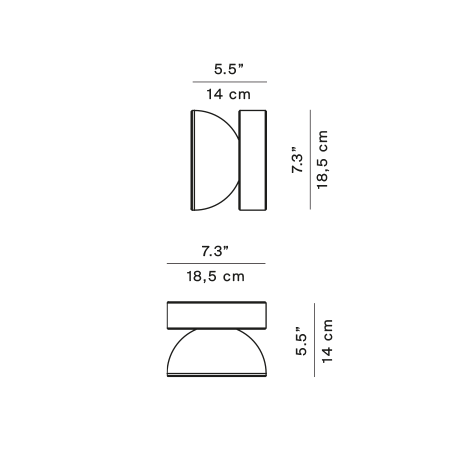NuiFloor
designed by Meneghello Paolelli
Balance, symbiosis and interaction: the crux of the design of the Nui collection of outdoor floor and wall lamps lies in the relationship between two overlaid cylindrical volumes that interact in a dynamic of reciprocal completion.
Parts of a single whole, these two volumes take on different, complementary roles. The upper block, in three variants, becomes the housing for the light source, hidden from view and aimed downward. The lower block, semispherical in its upper portion, acts as the support for the first while becoming the diffuser. The lamps are made in light grey concrete: the effect is that of minimal sculptural objects, but with a strong personality.
The four different models (three floor lamps and one wall lamp) can be used to personalize outdoor spaces in an unconventional, highly decorative way.
A02TA1
Nui A model

A02TA1
Nui A model
Main specifications
| Typology | Floor | ||||||
|---|---|---|---|---|---|---|---|
| Application | Outdoor | ||||||
| Material |
|
||||||
| Finishes |
|
||||||
| Dimensions (mm) | H 170, D ø 185 | ||||||
| Weight (kg) | 5.6 | ||||||
| Light Source | LED 14W (only light source – for more details, download datasheet), 3000K, CRI 90 | ||||||
| Insulation Class | III |
A02TB2
Nui B model

A02TB2
Nui B model
Main specifications
| Typology | Floor | ||||||
|---|---|---|---|---|---|---|---|
| Application | Outdoor | ||||||
| Material |
|
||||||
| Finishes |
|
||||||
| Dimensions (mm) | H 310, D ø 185 | ||||||
| Weight (kg) | 10.9 | ||||||
| Light Source | 3000K, CRI 90 | ||||||
| Insulation Class | III |
A02TC4
Nui C model

A02TC4
Nui C model
Main specifications
| Typology | Floor | ||||
|---|---|---|---|---|---|
| Application | Outdoor | ||||
| Material |
|
||||
| Finishes |
|
||||
| Dimensions (mm) | H 50, D ø 185 | ||||
| Weight (kg) | 5.5 | ||||
| Light Source | 3000K, CRI 90 | ||||
| Insulation Class | III |
A02TD2
Nui D model

A02TD2
Nui D model
Main specifications
| Typology | Floor | ||
|---|---|---|---|
| Application | Outdoor | ||
| Material |
|
||
| Finishes |
|
||
| Dimensions (mm) | H 140, D ø 185 | ||
| Weight (kg) | 5.3 | ||
| Light Source | LED 12W (only light source – for more details, download datasheet), 3000K, CRI 90 | ||
| Insulation Class | III |









